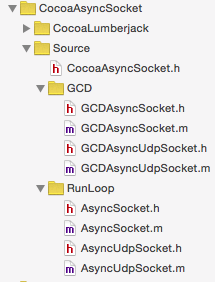上一篇乱说了一阵socket,这篇要说说怎么干活了。毕竟用的起来才行。
我的项目里面使用的是CocoaAsyncSocket,这个是对CFSocket的封装。如果你觉得自己可以实现封装或者直接用原生的,我可以告诉你,很累;关键是等你弄出来,项目可能都要交了。这个库,支持TCP和UDP;有GCD和RunLoop两种选择。UDP相比TCP的话,可靠性低一点,一般用来传输视频,少个一两帧没有什么影响。这里我就说一下TCP的使用,当然为了发挥Apple设备的牛X性能,我用GCD。

建立socket 单例
先说一点,要保持长连接。我们需要建一个全局的单例。标准单例模式写法⬇️
1 + (instancetype)ShareBaseClient { 2 static SocketClient * iSocketCilent; 3 static dispatch_once_t onceToken; 4 dispatch_once(&onceToken, ^{ 5 iSocketCilent = [[SocketClient alloc]init]; 6 }); 7 return iSocketCilent; 8 }
1 #define USE_SECURE_CONNECTION 0 // 是否需要使用安全连接 2 #define USE_CFSTREAM_FOR_TLS 0 // Use old-school CFStream style technique 3 #define MANUALLY_EVALUATE_TRUST 1 // 是否需要人工验证 4 5 6 - (id)init { 7 self = [super init]; 8 // Start the socket stuff 最后的那个是你的要放在哪个线程里面操作 果断全局 9 asyncSocket = [[GCDAsyncSocket alloc] initWithDelegate:self delegateQueue:dispatch_get_main_queue()]; 10 NSError *error = nil; 11 uint16_t port = DefalutPORT;// 默认的端口号 12 // 连接是否成功 13 // WWW_HOST 连接的地址 14 // 50秒 是我设置的 超时时间 15 if (![asyncSocket connectToHost:WWW_HOST onPort:port withTimeout:50.0f error:&error]){ 16 17 NSLog(@"Unable to connect to due to invalid configuration: %@", error); 18 19 }else{ 20 NSLog(@"Connecting to "%@" on port %hu...", WWW_HOST, port); 21 } 22 { 23 #if USE_SECURE_CONNECTION 24 25 #if USE_CFSTREAM_FOR_TLS 26 { 27 // Use old-school CFStream style technique 28 29 NSDictionary *options = @{ 30 GCDAsyncSocketUseCFStreamForTLS : @(YES), 31 GCDAsyncSocketSSLPeerName : CERT_HOST 32 }; 33 34 DDLogVerbose(@"Requesting StartTLS with options: %@", options); 35 [asyncSocket startTLS:options]; 36 } 37 #elif MANUALLY_EVALUATE_TRUST 38 { 39 // Use socket:didReceiveTrust:completionHandler: delegate method for manual trust evaluation 40 41 NSDictionary *options = @{ 42 GCDAsyncSocketManuallyEvaluateTrust : @(YES), 43 GCDAsyncSocketSSLPeerName : CERT_HOST 44 }; 45 46 DDLogVerbose(@"Requesting StartTLS with options: %@", options); 47 [asyncSocket startTLS:options]; 48 } 49 #else 50 { 51 // Use default trust evaluation, and provide basic security parameters 52 53 NSDictionary *options = @{ 54 GCDAsyncSocketSSLPeerName : CERT_HOST 55 }; 56 57 DDLogVerbose(@"Requesting StartTLS with options: %@", options); 58 [asyncSocket startTLS:options]; 59 } 60 #endif 61 #endif 62 } 63 return self; 64 }
接受报文
如果你连接成功了,那你就可以开始收发报文了。我这里用的是delegate模式,所以我们要实现一下几个比较重要的代理:
连接上的第一步,我们要准备读数据。我用一个简单的枚举标识了每次读取数据的区域,一般报文都是先读报头,再去解析正文的。所以连接上之后,要首先接受报头。
1 #define READ_HEADER_LINE_BY_LINE 0 2 3 typedef NS_ENUM(long, ReadTagType){ //读取数据的类型 4 ReadTagTypehead = 1,// 报头 5 ReadTagTypebody = 2 // 主体 6 }; 7 8 - (void)socket:(GCDAsyncSocket *)sock didConnectToHost:(NSString *)host port:(UInt16)port 9 { 10 NSLog(@"socket:didConnectToHost:%@ port:%hu", host, port); 11 12 // 是否一行一行的读数据,我这里设置的是 0 13 #if READ_HEADER_LINE_BY_LINE 14 // Now we tell the socket to read the first line of the http response header. 15 // As per the http protocol, we know each header line is terminated with a CRLF (carriage return, line feed). 16 [asyncSocket readDataToData:[GCDAsyncSocket CRLFData] withTimeout:-1.0 tag:0]; 17 18 #else 19 // Now we tell the socket to read the full header for the http response. 20 // As per the http protocol, we know the header is terminated with two CRLF's (carriage return, line feed). 21 // sizeof(protocol_head) 一个报文头的长度 22 // ReadTagTypehead 先读的是报文的头的 23 // -1代表没有超时时间 24 [asyncSocket readDataToLength:sizeof(protocol_head) withTimeout:-1 tag:ReadTagTypehead]; 25 26 #endif 27 }
开始读取后,有数据的话会进入这个代理。
1 - (void)socket:(GCDAsyncSocket *)sock didReadData:(NSData *)data withTag:(long)tag { 2 3 switch (tag) { 4 case ReadTagTypehead:// 先 读取 head部分 5 { 6 // 拿到之后,我们处理一下这段头 7 // 获得head里面的命令CMD 和 下一段正文的长度BodyLength 8 // 把这些参数传到一个方法里面处理一下(万一是空头呢。) 9 10 [self willReadBody:CMD size: BodyLength data:data]; 11 } 12 break; 13 case ReadTagTypebody:// 再 读取 body部分 14 { 15 // 加上这一段,我们取得了完整的数据了,可以给需要的地方发过去了 16 [self haveReadData:data]; 17 // 然后我们去读下一个报文,还是先读报文头 18 [asyncSocket readDataToLength:sizeof(protocol_head) withTimeout:-1 tag:ReadTagTypehead]; 19 } 20 break; 21 default: 22 break; 23 } 24 } 25 26 // 处理用的方法 下面两个是我写的私有方法 不是CocoaAsyncSocket的代理方法 27 // 准备读取body的数据 CMD需要记录下来的 28 - (void)willReadBody:(int)CMD size:(long)size data:(NSData *)data{ 29 gCMD = CMD; 30 alldata = [[NSMutableData alloc]initWithData: data]; 31 if(size == 0) {// 如果是空头,就丢掉这段数据,继续读下一个头 32 [self haveReadData:nil]; 33 [asyncSocket readDataToLength:sizeof(protocol_head) withTimeout:-1 tag:ReadTagTypehead]; 34 }else {// 如果不是的话,就去读下一段 报文的正文 35 [asyncSocket readDataToLength:dataBufferSize withTimeout:-1 tag:ReadTagTypebody]; 36 } 37 } 38 39 // 读取完数据了 要回调代理 40 - (void)haveReadData:(NSData *)data { 41 // 把头和正文拼接起来 构成完整的数据 42 if(data && data.length>0) 43 [alldata appendData:data]; 44 45 // NSLog(@"receiveData: %@",alldata); 46 if(alldata.length>0) { 47 // 这里去告诉 你需要处理数据的地方 让他去处理数据 48 } 49 alldata = nil; 50 }
到上面这一步的话,你的接受数据就算完成了。
发送报文
[asyncSocket writeData:data withTimeout:-1.0 tag:0];
就一行,不用怀疑。把你的信息转为NSData后 调用这个方法就好了。成功的话,会进入这个代理。
- (void)socket:(GCDAsyncSocket *)sock didWriteDataWithTag:(long)tag;
socket 断开
当然,socket也有断开的时候,所以你需要处理这个代理。这里面你可以发个通知,让你的application断线重连一下。PS:移动网络和Wi-Fi切换,socket会断开哦。
- (void)socketDidDisconnect:(GCDAsyncSocket *)sock withError:(NSError *)err
附加:
当我们连续收到错误报文的时候,我们需要主动断开socket。
// 先去掉代理 再断开连接 self.asyncSocket.delegate = nil; [self.asyncSocket disconnect];